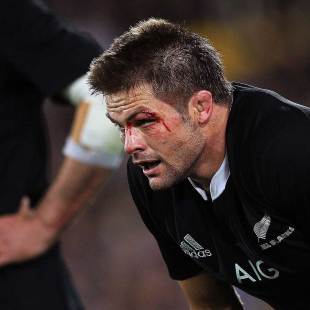|
Craig Dowd
New-school athletes need old-school guts
Craig Dowd
April 16, 2014

Richie McCaw embodies the determination to push through injury and fatigue
© Getty Images
Enlarge
There is a body of opinion in South Africa that says New Zealand teams are finishing games so well in the Republic because they are better conditioned than South African sides. This is something that has been around for at least 50-60 years. We've heard the stories about how, in the old days, teams en route to South Africa on boats would put on half a stone or more and then arrive and get hammered as a result. But in more recent times, the need to be fit has been appreciated and what Laurie Mains put us through to go to South Africa in 1995 for the World Cup was one of the hardest things I have ever experienced in my life. The theory behind it was that we were going to have to play at altitude and to get over that hurdle we were going to have to be that much fitter. No matter how fit you are, you are going to feel the effects of altitude. With the thinner air you can taste the blood in the back of your throat and while it is horrible, fitness is a way of getting over it and that has always been the foundation of going to South Africa. And that attitude has filtered right down to grass roots rugby in New Zealand. There's no escaping the fact that to play a good game of rugby you have just got to be fit. It doesn't matter how good you are as a coach, if you can get the boys fit then that goes a long way towards ensuring that your players are going to come through in the last 20 minutes of key games. The fitness of any team that has ever won a major trophy has been right up there. In New Zealand, I think we are subconsciously the beneficiaries of athletics coach Arthur Lydiard's creed about running to get fit. Professionalism has resulted in an interesting aspect, too. In the amateur era, the best players always worked hard to be as fit as possible and under that system the cream always came to the top. But under professionalism you have had guys involved for the money who now have trainers to get them fit. Those trainers were not around in the amateur days and guys would cut corners. And players who didn't do the hard yards did not go any further. Now kids are being picked out of school and being put in an environment where a trainer is going to ride them and take them to that next level and a whole new breed of athletes have come into the game. As a result, some players do not have the same self-discipline, or the same work ethic, that amateurs who wanted to succeed had before professionalism in 1995. But they get to the top because they have the physique and the trainers riding them. If some of these players had that old-fashioned attitude to want to be the best in the world, how much better could they be? You can see that Richie McCaw and Dan Carter exhibit that old-fashioned desire and genuinely want to be the best and a player like McCaw will play to a standstill, or through a broken foot, and there will be nothing more he can give. Having fitness and the attitude that you are going to play until the absolute death, that's the guy you want on your team. So the South Africans might feel they are behind now, but the bad news for them is there are still advances New Zealand players can make by going into oxygen debt and pushing that little bit further. When you get 15 players like that you will be unstoppable. To me, that is the next goal for New Zealand. You can pick guys on physical attributes and fitness, and all the rest of it, but the mental edge is what you look for. You look for the characteristic that pushes players to go another 10 percent. When everyone else stops they are still prepared to go that little bit further. That is what makes the difference. © ESPN Sports Media Ltd
|
Live Sports
Communication error please reload the page.
-
Football
-
Cricket
-
Rugby
-
- Days
- Hrs
- Mins
- Secs
F1 - Abu Dhabi GP
Abu Dhabi Grand Prix December 11-131. Max Verstappen ()
2. Valtteri Bottas (Mercedes)
3. Lewis Hamilton (Mercedes)
4. Alexander Albon ()
5. Lando Norris ()
6. Carlos Sainz Jr ()
-
ESPNOtherLive >>
Boxing - Nelson v Wilson; Simmons v Dickinson; Joshua v Gavern (Metro Radio Arena, Newcastle)
Golf - Houston Open
Snooker - China Open
Tennis - Miami Open

